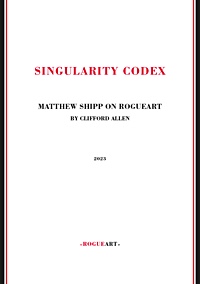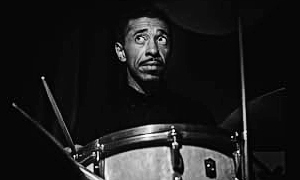Home » Jazz Articles » Book Review » Singularity Codex: Matthew Shipp on RogueArt
Singularity Codex: Matthew Shipp on RogueArt
I’ve learned… how to listen, ways to think—and Shipp’s approach to music, sound, and life is incredibly compelling, if not always easy to grasp on the first try.
—Clifford Allen
 Singularity Codex: Matthew Shipp on RogueArt
Singularity Codex: Matthew Shipp on RogueArt Clifford Allen
205 Pages
ISBN: # 2953150870
RogueArt
2023
Clifford Allen, a contributor to a number of jazz publications including All About Jazz, is the author of Singularity Codex: Matthew Shipp on RogueArt, Allen's first book. He takes on the iconic improviser's recording history with the French label. The glimpses into Shipp—the person—are largely through secondary analysis and interviews and reveal a few insights not widely known. Allen explains that the book's purpose is not biographical but an examination of the artist's twenty-five RogueArt projects. That analysis mainly takes place through the embedded liner notes that make up Section Three of the book.
Singularity Codex is a slim volume; just over two-hundred pages with about half the book consisting of the previously mentioned RogueArt liner notes. The first section initially concentrates on Shipp's background, from his education at the University of Delaware and Boston's New England Conservatory to the NYC music scene of the 1980s and 90s. Influenced by his family's link to Clifford Brown, vibraphonist Lem Winchester and the music of John Coltrane, Shipp tagged along with his father to gigs in the Wilmington and Philadelphia areas. He later found a more progressive direction studying under Ran Blake and Joe Maneri at NEC. The inventive music of David S. Ware and William Parker left an indelible mark on Shipp. In downtown NYC's post-loft era, poets and visual artists opened Shipp to discerning the creative process in a new, unconventional way.
The remainder of Section One is given to Allen's interviews with Shipp's colleagues. Parker, Rob Brown, Whit Dickey and guitarist/bassist, Joe Morris share their thoughts, but oddly, there is no parallel interview with Shipp. An interview with Japanese poet/visual artist Yuko Otomo consumes more than a dozen pages. Otomo's connection is through cover art and liner notes and she is the widow of poet Steve Dalachinsky who wrote liner notes for a number of Shipp's RogueArt albums. The insights vary in interest across the interviews. Brown's recollections, in particular, seem a bit vague in respect to his work with Shipp, though, in fairness, the two have recorded infrequently, and only once in the 2000s. The saxophonist's most revealing statement comes from his experience with Cecil Taylor, to whom Shipp is often—and inaccurately—compared. Brown says: "I did want to play with Cecil and eventually played with his big band, did some gigs, and went to Macedonia. I got over wanting to play with Cecil because everything involved is way too crazy."
Whit Dickey offers this breakdown of Shipp as a creator: "You know, I just gotta say overall with Matt, I've worked with him a lot and it's like going to school. He's consistent, a truly consistent performer... It's all mental for me but with Matt, he's just in the moment all the time. It's visceral, while I'm the analyst. It's part of his whole DNA." Joe Morris recalls his early reaction to working with Shipp. "My impression of Matt's playing is that he was, and is a really good improviser, and his music is more what I would classify as free modal than mine was... it was clear that Matt was really smart, involved, and ambitious—not in a cutthroat way, but he wanted to do things, and it's great to meet anybody you have a rapport with, who understands the complexity of this process."
William Parker's recollections are the most personal. He recalls the differences between two players that manage to work together with boundless synergy. "Matthew, he grew up listening to Elton John, David Bowie... and I never listened to David Bowie or Elton John because it didn't come across my trajectory. My sphere of existence, I could go knock on Ornette Coleman's door at 3 A.M. He's [Shipp] very loyal and you know, we battle, we've battled on some things, and some of the people he hangs out with, same thing I said to Daniel Carter, 'where'd you get that guy from? What do you see in this?' But he sees something and maybe later on I see something, which means I learned from that and began to move forward and see something that I couldn't see before."
The second of the book's three sections is the most technical as it deals with the well-known development of Shipp's unique musical lexicon; the logic and otherworldly groundwork from which the composer builds. The language is the essence of his music but it is for the composer/improvisor's creative process more than the listener. Shipp is pragmatic in his expectations of a listener's ability, and/or willingness, to get down in the methodological weeds. Allen quotes Shipp from 2013 where the pianist explains: "I don't have the energy to deal with semantics—people don't have a concept of what the music's about anyway, so if you change the word every time it just makes things harder for people. That's beyond language anyway; whatever you call it doesn't matter. Any profound experience you have will be beyond language..."
Allen's personal insight from working on this project, speaks to what many of Shipp's listeners have undoubtedly experienced. He says, "I've learned...how to listen, ways to think—and Shipp's approach to music, sound, and life is incredibly compelling, if not always easy to grasp on the first try." Shipp is one of the most interesting artists in a generation of creative music. To that end, Singularity Codex: Matthew Shipp on RogueArt should have been more compelling. Eighty-eight pages of footnotes in a two-hundred-seven-page book is not gripping. Shipp himself seems to be on the periphery of the original material and the interviewees are not always focused on the subject. Morris goes on about Sunny Murray, Brown about working in a particular recording studio, and Dickey about living in Brooklyn. These details may be of interest to the reader but they read out of context and shed no light on Shipp's RogueArt work.
Having concluded Singularity Codex: Matthew Shipp on RogueArt, readers may very well paraphrase Parker; who is this guy, Shipp? And who is the author if we don't feel a strong connection with Shipp? But Shipp's dedicated listeners build in mystery. Analyzing the axioms, musical calculus, and spirituality that blend, bend, and blur his music is a fool's errand. Allen was smart to provide an open notion for the reader's interpretation.
Tags
Book Review
Karl Ackermann
RogueArt
Matthew Shipp
Clifford Brown
John Coltrane
Ran Blake
Joe Maneri
David S. Ware
William Parker
Rob Brown
Whit Dickey
Joe Morris
Cecil Taylor
Elton John
David Bowie
Ornette Coleman
Daniel Carter
Sunny Murray
PREVIOUS / NEXT
Support All About Jazz
 All About Jazz has been a pillar of jazz since 1995, championing it as an art form and, more importantly, supporting the musicians who make it. Our enduring commitment has made "AAJ" one of the most culturally important websites of its kind, read by hundreds of thousands of fans, musicians and industry figures every month.
All About Jazz has been a pillar of jazz since 1995, championing it as an art form and, more importantly, supporting the musicians who make it. Our enduring commitment has made "AAJ" one of the most culturally important websites of its kind, read by hundreds of thousands of fans, musicians and industry figures every month.
























